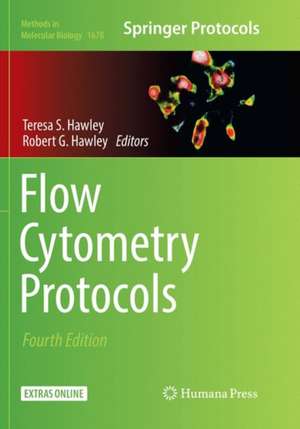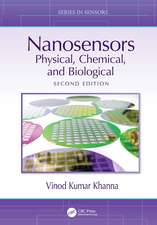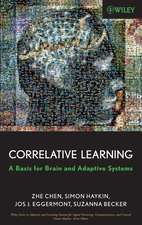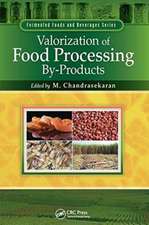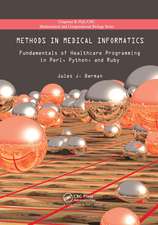Flow Cytometry Protocols: Methods in Molecular Biology, cartea 1678
Editat de Teresa S. Hawley, Robert G. Hawleyen Limba Engleză Paperback – 23 aug 2018
Cutting-edge and comprehensive, Flow Cytometry Protocols, Fourth Edition researchers and scientists who are interested in continuing or expanding their knowledge of flow cytometry.
| Toate formatele și edițiile | Preț | Express |
|---|---|---|
| Paperback (1) | 627.13 lei 38-44 zile | |
| Springer – 23 aug 2018 | 627.13 lei 38-44 zile | |
| Hardback (2) | 1136.74 lei 43-57 zile | |
| Springer – 26 oct 2017 | 1136.74 lei 43-57 zile | |
| Springer Us – 26 mar 2024 | 1238.42 lei 43-57 zile |
Din seria Methods in Molecular Biology
- 9%
 Preț: 791.59 lei
Preț: 791.59 lei - 23%
 Preț: 598.56 lei
Preț: 598.56 lei - 20%
 Preț: 882.95 lei
Preț: 882.95 lei -
 Preț: 252.04 lei
Preț: 252.04 lei - 5%
 Preț: 802.69 lei
Preț: 802.69 lei - 5%
 Preț: 729.61 lei
Preț: 729.61 lei - 5%
 Preț: 731.43 lei
Preț: 731.43 lei - 5%
 Preț: 741.30 lei
Preț: 741.30 lei - 5%
 Preț: 747.16 lei
Preț: 747.16 lei - 15%
 Preț: 663.45 lei
Preț: 663.45 lei - 18%
 Preț: 1025.34 lei
Preț: 1025.34 lei - 5%
 Preț: 734.57 lei
Preț: 734.57 lei - 18%
 Preț: 914.20 lei
Preț: 914.20 lei - 15%
 Preț: 664.61 lei
Preț: 664.61 lei - 15%
 Preț: 654.12 lei
Preț: 654.12 lei - 18%
 Preț: 1414.74 lei
Preț: 1414.74 lei - 5%
 Preț: 742.60 lei
Preț: 742.60 lei - 20%
 Preț: 821.63 lei
Preț: 821.63 lei - 18%
 Preț: 972.30 lei
Preț: 972.30 lei - 15%
 Preț: 660.49 lei
Preț: 660.49 lei - 5%
 Preț: 738.41 lei
Preț: 738.41 lei - 18%
 Preț: 984.92 lei
Preț: 984.92 lei - 5%
 Preț: 733.29 lei
Preț: 733.29 lei -
 Preț: 392.58 lei
Preț: 392.58 lei - 5%
 Preț: 746.26 lei
Preț: 746.26 lei - 18%
 Preț: 962.66 lei
Preț: 962.66 lei - 23%
 Preț: 860.21 lei
Preț: 860.21 lei - 15%
 Preț: 652.64 lei
Preț: 652.64 lei - 5%
 Preț: 1055.50 lei
Preț: 1055.50 lei - 23%
 Preț: 883.85 lei
Preț: 883.85 lei - 19%
 Preț: 491.88 lei
Preț: 491.88 lei - 5%
 Preț: 1038.84 lei
Preț: 1038.84 lei - 5%
 Preț: 524.15 lei
Preț: 524.15 lei - 18%
 Preț: 2122.34 lei
Preț: 2122.34 lei - 5%
 Preț: 1299.23 lei
Preț: 1299.23 lei - 5%
 Preț: 1339.10 lei
Preț: 1339.10 lei - 18%
 Preț: 1390.26 lei
Preț: 1390.26 lei - 18%
 Preț: 1395.63 lei
Preț: 1395.63 lei - 18%
 Preț: 1129.65 lei
Preț: 1129.65 lei - 18%
 Preț: 1408.26 lei
Preț: 1408.26 lei - 18%
 Preț: 1124.92 lei
Preț: 1124.92 lei - 18%
 Preț: 966.27 lei
Preț: 966.27 lei - 5%
 Preț: 1299.99 lei
Preț: 1299.99 lei - 5%
 Preț: 1108.51 lei
Preț: 1108.51 lei - 5%
 Preț: 983.72 lei
Preț: 983.72 lei - 5%
 Preț: 728.16 lei
Preț: 728.16 lei - 18%
 Preț: 1118.62 lei
Preț: 1118.62 lei - 18%
 Preț: 955.25 lei
Preț: 955.25 lei - 5%
 Preț: 1035.60 lei
Preț: 1035.60 lei - 18%
 Preț: 1400.35 lei
Preț: 1400.35 lei
Preț: 627.13 lei
Preț vechi: 814.46 lei
-23% Nou
Puncte Express: 941
Preț estimativ în valută:
119.100€ • 125.63$ • 99.29£
119.100€ • 125.63$ • 99.29£
Carte tipărită la comandă
Livrare economică 02-08 aprilie
Preluare comenzi: 021 569.72.76
Specificații
ISBN-13: 9781493984596
ISBN-10: 1493984594
Pagini: 492
Ilustrații: XIV, 492 p. 107 illus., 80 illus. in color.
Dimensiuni: 178 x 254 mm
Ediția:Softcover reprint of the original 4th ed. 2018
Editura: Springer
Colecția Humana
Seria Methods in Molecular Biology
Locul publicării:New York, NY, United States
ISBN-10: 1493984594
Pagini: 492
Ilustrații: XIV, 492 p. 107 illus., 80 illus. in color.
Dimensiuni: 178 x 254 mm
Ediția:Softcover reprint of the original 4th ed. 2018
Editura: Springer
Colecția Humana
Seria Methods in Molecular Biology
Locul publicării:New York, NY, United States
Cuprins
Flow Cytometry:- The Glass is Half Full.- High-Dimensional Modeling for Cytometry: Building Rock Solid Models using GemStoneTM and Verity Cen-se’TM t-family: Helvetica, sans-serif; background-image: initial; background-position: initial; background-size: initial; background-repeat: initial; background-attachment: initial; background-origin: initial; background-clip: initial;">High-Definition t-SNE Mapping.- Mass Cytometry Assays for Antigen-Specific T Cells using CyTOF.- RNA Flow Cytometry using the Branched DNA Technique.- Analysis of Individual Extracellular Vesicles by Flow Cytometry.- Quantitative Fluorescence Measurements with Multicolor Flow Cytometry.- High Throughput Flow Cytometry for Cell Surface Profiling.- Multiparameter Conventional Flow Cytometry.- Multiparameter Intracellular Cytokine Staining.- Multiparameter Analysis of Apoptosis by Flow Cytometry.- Multiparameter Cell Cycle Analysis.- Monitoring Cell Proliferation by Dye Dilution: Considerations for Probe Selection.- Immunophenotypic Identification of Early Myeloerythroid Development.- Flow Cytometry Assays in Primary Immunodeficiency Diseases.- Real-Time Deformability Cytometry: Label Free Functional Characterization of Cells.- Nuclear Cytometry: Analysis of the Patterns of DNA Synthesis and Transcription using Flow Cytometry, Confocal Microscopy, and RNA Sequencing.- Flow Cytometric FRET Analysis of Protein Interactions.- Overview of Fluorescence Lifetime Measurements in Flow Cytometry.- Overview of Lasers for Flow Cytometry.- Flow Cytometry: The Glass is Half Empty.
Textul de pe ultima copertă
This fourth edition volume expands on the previous editions by presenting readers with new and emerging methodologies in cytometry. The chapters in this book cover various topics such as quantifying surface and intracellular protein biomarkers, intracellular cytokine staining, apoptosis analysis, cell cycle analysis, tracking cell proliferation, and monitoring protein-protein interactions using FRET. Some developing methodologies that explored are mass cytometry, vesicle flow cytometry, time-resolved flow cytometry, and real-time label-free deformability cytometry. Written in the highly successful Methods in Molecular Biology series format, chapters include introductions to their respective topics, lists of the necessary materials and reagents, step-by-step, readily reproducible laboratory protocols, and tips on troubleshooting and avoiding known pitfalls.
Cutting-edge and comprehensive, Flow Cytometry Protocols, Fourth Edition is a valuable resource for researchers and scientists who are interested in continuing and/or expanding their knowledge of flow cytometry.
Cutting-edge and comprehensive, Flow Cytometry Protocols, Fourth Edition is a valuable resource for researchers and scientists who are interested in continuing and/or expanding their knowledge of flow cytometry.
Caracteristici
Includes cutting-edge methods and protocols Provides step-by-step detail essential for reproducible results Contains key notes and implementation advice from the experts Includes supplementary material: sn.pub/extras
